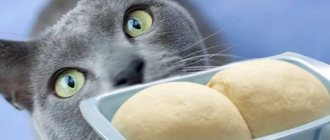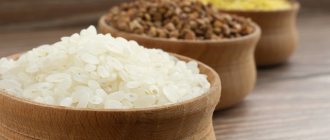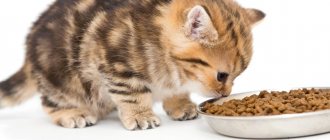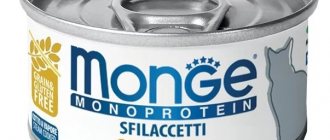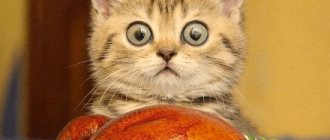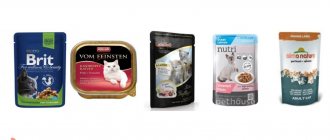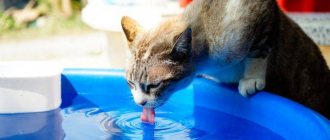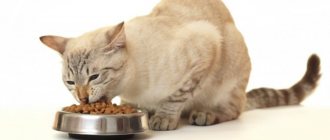8910Administration
Although fish products do not occupy a priority place in the diet of domestic cats, they are still allowed as a source of protein, which is easier to digest than the analogue contained in meat. They are also necessary to replenish the body with omega acids. When introducing them into the diet, cat owners often have a question about what kind of fish can be given to cats. In this case, it is important to take into account not only the species diversity of fish, but also the form in which they will be included in the cats’ menu.
What kind of fish can you give your cat?
Fish should not be fed without pre-treatment:
- The heads and fins are cut off and the scales are removed.
- If you plan to feed it raw, it should be frozen for a week.
- When cooking, do not add salt, pepper, or seasonings.
- The prepared product is disassembled into pieces, the bones are removed, fed separately or mixed with chopped vegetables and porridge in a ratio of 3 to 1.
- Before serving, bring to room temperature: cool or defrost.
Representatives of salmon and cod are more suitable for feeding cats:
Keeping a cat on one fish is harmful, despite the undeniable benefits.
Raw or cooked
Nothing will happen to your cat from eating a piece of fish once a week, so a reasonable solution is to alternate raw and cooked fish and not overfeed. Before entering shopping centers, it undergoes veterinary control and is frozen at minus 40 ℃. Danger lurks in fresh fish, which has just been caught from the river or bought secondhand. This product cannot be given.
The cat will not develop health problems if you do not take fish as the basis of its diet, choose healthy species for it, pre-disinfect it and cook it.
Why fish can be dangerous
With constant feeding, excess minerals and harmful components accumulate in the body:
- Excess magnesium and phosphorus are not absorbed and are deposited in the kidneys, which is why KSD develops.
- Histamine in the protein accumulates and provokes allergic reactions. The animal develops itching, dandruff, and hair loss.
- The enzyme thiaminase destroys thiamine, which disrupts metabolic processes.
- Excess fatty acids against the background of tocopherol deficiency provoke inflammation of adipose tissue and the development of panniculitis.
- The fish component trimethylamine oxide interferes with the absorption of iron, which leads to anemia.
- Cats do not absorb vitamin K from fish. It is responsible for blood clotting, so the animal runs the risk of dying from internal hemorrhages.
- Excess iodine leads to the development of hyperthyroidism, and the functions of the thyroid gland are disrupted.
- Wild marine and river species are parasitized by helminths. When they enter the intestine, they pass through the walls and migrate with the bloodstream throughout the body.
The composition of fish depends on the environment. Chemicals and metal salts are found in wild specimens; antibiotics and hormones are found in farm specimens; they are added to accelerate growth and prevent diseases.
Feeding the animals
I asked the veterinarian. The answer was: definitely raw. Raw sea
. If you give it boiled, then it’s better not to give anything fishy at all.
A comprehensive answer can be found here. In my opinion, there are more than enough arguments! https://www.po4emu.ru/content_category/jivotnie/58.htm
Pear! For me, communication on the forum is primarily an exchange of experience. You can, of course, argue and prove your point of view, this applies to both you and others. I just share my information and try to listen to the opinions of other people, but I prefer to check, re-read any information, find answers in articles. After all, vets are people too and everyone has their own opinion, and our task is to take into account all the pros and cons, and The main thing is not to harm your pets.:-B
Message from Kasyun
Pear! For me, communication on the forum is primarily an exchange of experiences.
Well? Am I preventing you from changing your experience by expressing my point of view?
Well, actually, not all fish contain the thiaminase enzyme, but herring and carp: herring, sprat, mackerel, pollock, cod and the enzyme is contained mainly in their insides (.) ... besides, some serious damage to B1 could be reported I would say with a constant diet of this fish... B1 is still needed by the body in minute quantities, which cannot be said about calcium, which is not absorbed at all without vitamin D... if we are talking about antivitamins, then many who like to give raw eggs to cats also “expose” them danger, because egg white contains ovidin, a protein that binds biotin and prevents its absorption in the intestines of cats...
About feeding your cat (proper nutrition)
First, let's talk about the features of the physiology of digestion in cats. We must remember that cats are purely carnivorous animals (unlike, say, dogs, which are conditionally carnivorous)! Cats are predators, so they have certain characteristics in their needs. These characteristics include dependence on the amino acid arginine, which is part of proteins only of animal origin; dependence on the amino acid taurine, the deficiency of which causes dysfunction of the nervous system, cardiovascular system, etc.
Taurine is found in fish, lamb and beef. It is also necessary to have fats of animal origin in the diet, because... they are a source of arachidonic acid, important for cats. Fats of animal origin cannot be neglected. They are a source of fatty acids that regulate the condition of the coat, etc. Those. what is the conclusion? The diet should consist of 80-90% protein foods.
"Natural"
First, let's talk about the homemade diet, the so-called “natural diet”. As you already understood, feeding a cat pasta, bread, cereals, etc. wrong, because fiber and cellulose (which are rich in foods of plant origin) are simply not digestible by cats.
So, for natural feeding there are 4 food groups:
- Meat and fish
- Dairy and eggs
- Fats and oils
- Vegetables and grains
- + Mineral and vitamin supplements
Now let's talk about everything in order.
MEAT and fish:
it could be beef, chicken, turkey, rabbit, offal.
- beef: finely chopped, scalded, streaked (streaked is even better than
veal fillet, because there is more water in the fillet)
- lamb: young, lean
- rabbit: best boiled
- pork - better to refuse! You can VERY rarely, and then boiled tenderloin. Fatty meats can cause vomiting and gastrointestinal upset.
Those. a cat needs 50-100g of minced meat per day (but not minced meat! Minced meat passes through the intestines too quickly, without stimulating it and without creating a feeling of fullness).
By-products:
liver (no more than once a week, well scalded because raw it can act on the intestines as a laxative, boiled - it strengthens, and it’s not worth it more often, because it is low in calcium and sometimes causes allergic manifestations), kidneys (soaked for at least 1 hour and boiled), heart (boiled), lung (sometimes, because it is essentially low in nutrition)
What fish should you not feed your cat?
Cats are prohibited:
- Waste . Heads and bones injure the esophagus, larynx, get stuck in the intestines, and do not carry anything useful. They have little calcium.
- Salty . Excess salt is deposited in the bladder and kidneys, which provokes the development of urolithiasis.
- Smoked . Contains carcinogens and allergens. Helminths are not destroyed by smoking.
- Canned fish . Seasonings, salt, and spices disrupt metabolism.
- Fried . Excessive fat disrupts the functioning of the pancreas and liver. Calorie content increases by 2–3 times.
- Sun-dried, dried . The fish is sprinkled with salt or soaked in a saline solution, so the final product is unsuitable for cats.
The table lists the fish varieties that should not be given:
How to cook?
You can treat your pet to boiled cod.
There are various recipes for fish treats for cats. Boiled cod is prepared as follows:
- Place the prepared fillet into boiling water.
- Cook the fish for 4-6 minutes. until soft.
- Cool.
Pollock for cats should be boiled or thoroughly frozen for consumption raw. Kittens and pregnant cats can also make dishes from this type of fish. It is better for them to cook pollock. Heat-treated fillet is easier for the cat's stomach to digest. But giving this fish is often not recommended, since excess minerals are difficult to absorb by the body.
According to veterinarians, it is not advisable to give salted fish to cats, since the salt it contains significantly exceeds the permissible daily allowance for a cat.
Fish for cats - examples of what is and is not possible
Most cat owners sooner or later face the question of whether they can give their furry pet fish. Cats belong to the category of carnivores. According to their physiological needs, the diet should contain dishes that enrich the body with proteins and fats. In addition, the animal requires the intake of the amino acid arginine, aminosulfonic and arachidonic acids. The listed substances help to establish metabolism in the mustachioed body and restore the normal functioning of internal organs.
Fish contains a high percentage of phosphorus. If you often feed your animal fish delicacies, there is a risk of triggering the development of urolithiasis. However, most veterinarians believe that not all pets are susceptible to this disease, but only those with weak immunity. The information presented below will help you figure out whether fish for cats will be harmful or beneficial to the body.
A fish delicacy for a pet can both strengthen and weaken the immune system.
Dry pollock meat
To determine the juiciness of a fish, you need to determine its water-holding capacity. This indicator is very important. It indicates the process of protein denaturation and the quality of muscle tissue. The fresher the fish and the less the fillet has been exposed to temperature fluctuations, the higher this indicator.
According to the quality requirements for fish products, the water-holding capacity must be at least 50%. Experts have found that the following brands of pollock meet these standards:
These varieties of fish can be considered the most juicy.
The need for fish for cats
Can cats fish and is it necessary to include this delicacy in your pet’s diet? Veterinary experts believe that the menu for four-legged friends can include boiled marine fish. Before cooking the product, you need to separate all the bones to avoid injury to the animal’s larynx and esophagus.
Can a neutered cat eat fish?
Why can't cats fish? It is believed that after castration the risk of developing bladder stones increases. Poor nutrition can contribute to the development of a dangerous pathology. However, some veterinary experts believe that it is still possible to occasionally give fish delicacies in small quantities to pets who have undergone the castration procedure.
Note! The presence of fish in the diet of animals does not in any way affect the risk of urolithiasis, despite the fact that the product contains a large percentage of phosphorus, which creates conditions for the formation of struvite in the bladder area.
Fish for a sterilized cat
Why can't cats be fed fish? Cats that have been neutered should not eat this product frequently. Scaly ones can only be in a pet’s diet as a rare treat. Although, if possible, it is better to avoid such a product.
Important! Under no circumstances should you give raw products, as this risks, at a minimum, infection with helminthiasis. If you want to give your cat a fish, you should give preference to marine varieties that will do more good than harm. All dice must be pre-selected.
Is it possible to give canned food?
Super-premium canned food, which is prepared for fluffy purrs, does not contain harmful substances. Among the main ingredients of the products, there are a large number of natural elements, minerals and vitamins that can help restore the health of the animal and compensate for their deficiency in the body. However, when choosing canned food, you should pay attention to quality. Of course, not every owner has the opportunity to purchase ready-made holistic food, but a super-premium diet is available to the majority of consumers.
Important! Fish, like milk, should rarely be present in the diet of animals.
What kind of fish to give: raw or boiled
It is important to pay attention not only to the type of fish, but also to the method of its preparation. It is unacceptable to give your pets whole fish raw. It is worth considering that not every part is digested by the four-legged friend’s body in the same way. In addition, raw fish can cause the development of helminthiasis. Cat owners who introduce raw food into their cat's daily diet can cause a deficiency of vitamin B1 in the body. If a cat eats raw fish systematically, its health will undoubtedly worsen.
General information
Naturally carnivorous cats need a lot of protein. Cats also need carbohydrates, in very small quantities. With natural feeding, 80% of the food in the diet should serve as sources of protein.
The basis of a cat's diet should be meat - beef, veal, poultry, rabbit. Eating pork is acceptable if the meat is lean and well cooked. It is better to freeze the meat and serve it raw; this method is more natural. An adult cat with healthy teeth is fed meat in pieces. There is no need to cook mince because the teeth remain healthy while the cat needs to chew its food.
Milk and dairy products must be present in a cat's diet. Preference is given to cottage cheese, yogurt, homemade yogurt and natural cheese. Whole milk can cause diarrhea, which indicates lactose intolerance. Store-bought dairy products are made from a powder mixture, so their benefits are questionable.
We invite you to familiarize yourself with: Black German Shepherd
Chicken and quail eggs are a source of protein, fats and vitamins. The only disadvantage of the product is the risk of allergies and high calorie content. Eggs should be present in a cat's diet no more than 1-2 times a week. Quail eggs can be given more often. As for preparation, it all depends on the cat’s preference; some purrs like boiled eggs, and some like raw ones. Alternatively, you can make an omelet from one egg and milk (without butter).
Vegetables, fruits and grass are a source of vitamins and coarse fiber. Your cat must be fed coarse fiber otherwise its digestive system will not work properly. Cats rarely eat vegetables in their pure form, so they are chopped and mixed with cottage cheese or meat. Vegetables can be given raw or cooked.
Cereals are a source of carbohydrates. As mentioned above, a cat does not need large amounts of carbohydrates, so porridge does not need to be given more than 2 times a week. Rice and buckwheat are good for feeding cats; you need to be careful with other cereals.
What kind of fish can you feed cats?
Not every animal owner knows which fish is healthier for a purring pet - sea or freshwater. Veterinarians advise against the second option. It is unacceptable to feed castrated pets with such fish. It is more advisable to offer your cat fillet as a fish treat:
Salmon is a healthy treat for cats
However, even such a healthy cat fish should not become the basis of the furry purr’s diet. And in this case, it doesn’t matter whether they are just planning to castrate/sterilize the pet or have already done it. The delicacy should be served in small quantities. As a rule, it is included in the cat's menu once every 6-10 days. The portion should be small. It should be borne in mind that the body of a mustachioed friend needs to obtain large amounts of fatty acids.
Often, pet owners lacking experience are interested in how much to cook blue whiting for a cat (or another type of product). After the water boils, the delicacy should simmer over low heat for about 15-20 minutes.
For your information! If it is not possible to cook the fish fillet, it should be pre-frozen (beef and chicken are prepared in the same way for fluffy purrs). The procedure should last about 24-48 hours. It is recommended to freeze only fresh products, since repeated freezing contributes to the destruction of beneficial omega-3 acid.
When choosing fish for your pet, it is important to pay attention to freshness
In order not to worry about your cat becoming infected with helminths, it is best to boil the fish fillet. Cooking will be able to destroy the harmful thiaminase enzyme contained in the composition and will not reduce the percentage of beneficial omega acids. After the fish fillet has been boiled and cooled, you should inspect it, removing bones that are not able to be digested in the animal’s body after cooking.
Note! If your pet is served fish that has been frozen, it is acceptable to leave the cartilage.
Fluffy purrs can feast on fish delicacies no more than 4-5 times a month. It is advisable to mix the sirloin with a small amount of oatmeal and chopped vegetables. The frequency of feeding castrated cats with fish products should not exceed 2 times a month. This will minimize the risk of bladder stones. If the diet contains factory-made food with fish ingredients, it is better to completely exclude the fish product from the menu of the four-legged friend, which will make it possible to avoid upset of the digestive system.
Fish is a product that can only be given to cats occasionally. However, it is very important which species is present on the animal’s menu. It’s better to avoid freshwater altogether. It is unlikely to bring any benefit, but it may well cause infection with helminths or the development of urolithiasis. For your pet to live for many years, it is important to provide it with the right diet.
A package of pollock fillets contains more ice than fish
There are technical regulations according to which the ice crust content in fish fillets should be no more than 5%. Experts found that thirteen brands of pollock meet this standard, and two do not.
However, it is important to take one detail into account. The actual net weight of the fish after defrosting must be equal to the declared fillet weight indicated on the packaging. All fifteen brands of pollock met this standard, including those where the ice crust content exceeded the norm. This suggests that the buyer is not being shortchanged. He pays for the weight of the fish that was declared.
A thick crust of ice is not a disadvantage. It protects the fillet from spoilage and loss of liquid. A large amount of ice glaze only affects the duration of defrosting, but does not affect the taste of pollock.
The benefits and harms of a fish diet
Fish is a product that is not mandatory in the diet of cats, but is loved by animals. You can’t argue that its benefits are obvious: it contains healthy fatty acids that promote the growth of beautiful hair, stop inflammatory processes in the body, and support vascular health.
However, it is important to know about the dangers of fish when consumed in abundance. This is evidenced by a combination of reviews from cat owners, as well as the opinions of practicing veterinarians.
- Urolithiasis disease . Due to excess magnesium when consuming fish and the balance of minerals, the functioning of the kidneys of healthy pets gradually becomes more difficult, which leads to the provocation of the development of this serious disease. It is especially contraindicated in castrated and sterilized cats.
- Metabolic disorder or, in other words, oxidative stress in the body. It develops especially actively in cats that eat only raw fish.
- Overweight. This occurs due to a lack of vitamin E and oversaturation with fatty acids. All adipose tissue of the body becomes inflamed, body temperature rises, and general lethargy appears. Sometimes even soft and gentle touches to the fur will cause pain in the cat.
- Difficult metabolism. Fish contains a lot of thiaminase, an enzyme that destroys vitamin B1, which is so necessary for pets. This enzyme can be destroyed by heat treatment or boiling the product for 30-40 minutes, but the beneficial properties are also lost.
- Anemia. Fish contains trimethylamine oxide, which does not allow iron to be absorbed in cells, therefore the development process of the animal slows down and leads to infertility.
- Hyperfunction of the thyroid gland. This disease develops in cats that consume fish products every day and in unlimited quantities.
- Excess fish in the diet leads to a lack of vitamin K, which is responsible for blood clotting. For this reason, very often animals die in case of hemorrhage in the gastrointestinal tract and liver.
- Infection with helminths . As is known, fish are carriers of parasite larvae that can infect pets.
- This product is also a strong allergen and can provoke the development of allergic reactions.
- Pets often injure the esophagus and intestines with sharp bones.
Against the backdrop of all the dangers that await our pets when eating fish, the benefits are lost. Before you diversify your cat's menu with his favorite delicacy, you should think about the consequences.
Owners' opinions
Owners' opinions on the need to include fish in a pet's diet are very contradictory. Many believe that a natural product is better than any canned food, while others responsibly follow the recommendations of experts and exclude fish from the animal’s daily menu.
Let's look at a few arguments coming from supporters of “fish in a cat's diet” and find out what contradictions there are to their statements. All village and street cats eat fish and have no health problems!
Here it is necessary to note a statistical fact - country and street cats live less than their relatives living at home under the watchful care of the owner. Due to poor nutrition, such representatives quickly develop dangerous diseases that significantly shorten the life of the animal.
A friend of mine's cat ate fish all the time and lived a long and carefree life!
Comparing the life of another animal with your ward is a useless idea. Each living creature has an individual body, so it is impossible to predict exactly how your cat will react to constant consumption of fish. If you do not want to risk the life and health of your beloved cat, it is better to listen to the advice of experienced specialists!
Fish oil is a necessary and very healthy product for cats!
All veterinarians in the world absolutely agree with this argument, but at the same time they still recommend replacing the natural product with artificial additives created specifically for representatives of the feline family.
Such compositions do not contain harmful elements that contribute to the development of various diseases in cats, leading to the early death of the animal.
